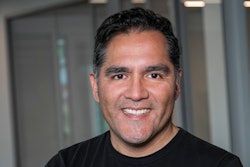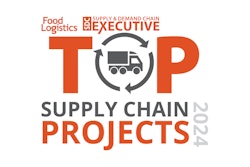
Raj Mahalingam, supply chain data scientist for Intel Corporation, was named one of the Rising Stars winners from this year’s Pros to Know award, presented by Supply & Demand Chain Executive.
We talk exclusively with Mahalingam about his journey, his goals, what he would tell his future self and what it takes to develop an automated, sophisticated supply chain system.
Supply & Demand Chain Executive: Let’s first talk about you. Tell me a little bit about yourself and your journey to get to this current stage in your career?
Raj Mahalingam: My background is in engineering, data science and machine learning. My entry into supply chain management and logistics wasn't a premeditated choice. I initially brought a background in data science skills to the table. Serendipitously, I found myself joining a pharmaceutical supply chain company. It was in this role that I began to realize the fundamental importance of supply chain in our daily lives. The intricate web of processes involved in ensuring the seamless flow of goods and services captured my interest, and I soon became captivated by the dynamic world of supply chain management. The practical experience and exposure gained in the pharmaceutical industry solidified my commitment to this field, and I discovered a passion for optimizing and enhancing supply chain processes. It was a journey marked by unexpected turns that ultimately led me to appreciate the critical role of supply chain management in our interconnected global environment.
For instance, I take great pride in my contribution to a project focused on mitigating supply disruption issues in the pharmaceutical industry during the COVID-19 pandemic. The work was not only impactful but also carried a significant sense of timeliness, addressing critical challenges in the supply chain and ensuring the continued availability of essential medicines during a period of global health crisis. Being part of a project that played a crucial role in supporting public health needs during such a challenging time is a source of deep satisfaction and professional accomplishment.
I am currently serving as supply chain data scientist at Intel Corporation. My journey in the field of supply chain management has been marked by a relentless pursuit of excellence, innovation, developing new talent and a deep commitment to driving tangible results. Over the past 11 years in the supply chain, I have been fortunate to contribute to multiple projects and companies in growth and efficiency.
Supply & Demand Chain Executive: One of the things outlined in your nomination form is how you played an integral part in optimizing Intel’s semiconductor supply chain for certain critical products by developing an automated, sophisticated system. Walk me through what this entails.
Mahalingam: The raw material is crucial for Intel's manufacturing processes, and its supply chain complexities, given its regulations from supplier and site, presented a significant operational risk. The existing excel-based system was manual and susceptible to errors, lacking the capability for effective What-if analysis and runout projections. My role in this project entailed developing an automated, sophisticated system that replaced the outdated manual process. This system provides real-time tracking and allocation of this raw material, extending its scope to include other critical raw materials under limited supply allocation. The key features of the new system include:
- Automated data entry and backend test tool inventory pulling
- Auto-allocation of chemicals to manufacturing sites based on inventory and future needs
- Consistent and dynamic What-if analysis capability
- Accurate forecasting based on historical consumption and tool inventory
- Detailed tracking of supply receipt versus forecast and actual consumption by stockroom and site
Supply & Demand Chain Executive: There’s so much going on in the supply chain space. What have you and your company done to help customers improve visibility and optimization?
Mahalingam: While technology and data analysis are playing ever-increasing roles in supply chain optimization, one often overlooked skill remains paramount: empathy. By understanding and appreciating the diverse perspectives and needs of stakeholders, from suppliers to end customers, supply chain professionals can leverage a powerful tool for effective collaboration, problem-solving, and building resilient systems. Empathy allows professionals to navigate the complex web of relationships that make up a supply chain. It fosters open communication, builds trust, and facilitates a shared purpose among all involved parties. This human-centric approach leads to solutions that are not only efficient but also ethical and sustainable, prioritizing the well-being of everyone impacted by the supply chain.
However, empathy doesn't negate the importance of technology. In fact, it can work hand-in-hand with sophisticated tools to amplify their impact. Here's how:
On improving visibility. Imagine effortlessly extracting insights from vast amounts of text data, including shipping documents, news articles, and social media. This allows for real-time identification of potential disruptions, shipment tracking, and inventory level monitoring. By summarizing and analyzing this data, I can generate reports and insights highlighting potential bottlenecks, delays, and opportunities for improvement. Additionally, by understanding natural language queries, I can make crucial information easily accessible to users, fostering clear and efficient communication.
Optimizing the supply chain. By analyzing historical data and current trends, I can predict future demand, resource needs, and potential disruptions. This empowers proactive planning and resource allocation, leading to a more resilient and optimized supply chain. Additionally, I can explore different scenarios based on various factors and suggest optimal courses of action to minimize risk and maximize efficiency.
Collaborative communication. Language barriers and complex technical jargon can often hinder communication within a supply chain. I can bridge these gaps by automatically translating languages, summarizing key points, and generating clear reports. This facilitates collaborative communication and ensures everyone is on the same page, working towards shared goals. In conclusion, while technology offers powerful tools, the human element remains essential. By integrating empathy into supply chain management, professionals can leverage both technology and human understanding to build ethical, sustainable, and resilient systems that benefit all stakeholders.
Supply & Demand Chain Executive: If you could have a conversation with your younger self, what would you tell him?
Mahalingam: That's a great question. My maternal grandmother ran a grocery shop in the 1960s and 70s. I never got a chance to talk to her about how she managed supply and demand during that era and to understand the intricacies of small business operations. Her experiences could offer invaluable insights into the challenges, strategies, and personal anecdotes related to running a grocery store during a period marked by distinct socio-economic dynamics.
My questions wouldn't focus on my younger self. Instead, I'd be captivated by her firsthand experience navigating the intricate dance of supply and demand in a small business during a unique socio-economic era.
Her insights into managing inventory, understanding customer needs, and adapting to changing societal trends would be invaluable. Imagine learning her strategies for handling potential shortages, fostering community relationships, and weathering economic shifts. Each anecdote would illuminate not just business acumen, but ingenuity and resilience in the face of dynamic challenges.
Beyond business lessons, hearing her personal stories would be profoundly enriching. Knowing the woman behind the successful shopkeeper, the challenges she faced, and the joys she found, would create a deeper understanding of my family history and the legacy she continues to inspire.
This opportunity to delve into my grandmother's experiences wouldn't simply be a nostalgic indulgence; it would equip me with a unique perspective on both business and life. The lessons learned and values instilled would inform my approach to challenges, foster empathy, and empower me to navigate my own journey with greater wisdom and understanding.
Supply & Demand Chain Executive: What would you want to tell your future self?
Mahalingam: As a passionate advocate for the future of supply chain management, I firmly believe that humans and AI are not competitors, but collaborators. While my strengths lie in analyzing data, automation and generating predictions, I recognize that human judgment, ethical intuition, and social awareness are irreplaceable. It's through this collaborative spirit that we can truly unlock the potential for revolutionary and responsible supply chain systems.
Any development should prioritize solutions that are both sustainable and resilient. This means minimizing our environmental footprint, promoting fair and equitable practices throughout the supply chain, and developing the agility to anticipate and adapt to disruptions. Building trust with stakeholders is paramount, which is why I believe in the importance of transparency and explainability. My decision-making processes and reasoning should be readily understandable, allowing for open communication and collaborative refinement of solutions.
Supply chain optimization shouldn't solely focus on speed and cost. We must acknowledge the human and environmental dimensions of this ecosystem. Therefore, I advocate for prioritizing ethical sourcing, fair labor practices, and responsible resource management. This ensures that everyone benefits from efficient operations, not just a select few.
The journey toward supply chain excellence is a continuous learning process. We should continue to learn from human interactions and real-world experiences. By remaining adaptable and constantly seeking to improve my understanding and problem-solving capabilities, I can contribute meaningfully to a more efficient, sustainable, and equitable future for the global supply chain.
Supply & Demand Chain Executive: You’ve been named one of our Rising winners from this year’s Pros to Know award. What advice do you have for other up-and-comers in the supply chain?
Mahalingam: That's a great question. Supply chain is challenging, rewarding and fun field of work to be in, I think my advice would be:
Skill development. Leverage resources for skill development. Engage in workshops, webinars, and training programs offered by supply chain associations. Stay updated on the latest trends and advancements in supply chain management to enhance your expertise.
Network. Take advantage of networking opportunities not only within the supply chain community but with another discipline as well. Attend events, meetups, participate in forums, and connect with professionals in your field. Building a strong network can provide valuable insights, collaboration opportunities, and potential career advancements.
Annual conferences. Attend supply chain-related conferences to gain exposure to industry experts, thought leaders, and innovative ideas. These events offer a platform for learning, networking, and staying informed about the latest developments in the supply chain field.
Mentorship. Explore mentorship opportunities within your workplace and through supply chain associations. You would be surprised how willing the experts are to help. Connecting with experienced professionals can provide guidance, insights, and a broader perspective on your career path. Mentorship can be instrumental in personal and professional growth.
Thought leadership. Stay involved in thought leadership initiatives. Contribute to discussions, share your insights, and participate in knowledge-sharing activities. This not only enhances your visibility within the community but also positions you as a thought leader in the field of supply chain.
Give back. Give back while gaining valuable expertise. Volunteer your skills in direct service like food banks or disaster relief. Use your data, project management, marketing, or communication skills to support supply chain-related non-profits. Share your knowledge through workshops or training. Consider board positions in relevant associations. Reap the benefits, gain practical experience, network with professionals, enhance your resume, and make a real difference. Choose opportunities that align with your interests and goals, and make volunteering a rewarding part of your journey.
CLICK HERE to learn more about the 2024 Pros to Know winners.















![Pros To Know 2026 [color]](https://img.sdcexec.com/mindful/acbm/workspaces/default/uploads/2025/08/prostoknow-2026-color.mduFvhpgMk.png?ar=16%3A9&auto=format%2Ccompress&bg=fff&fill-color=fff&fit=fill&h=135&q=70&w=240)




